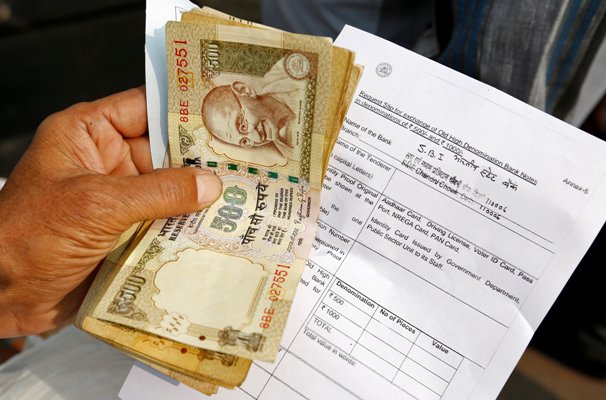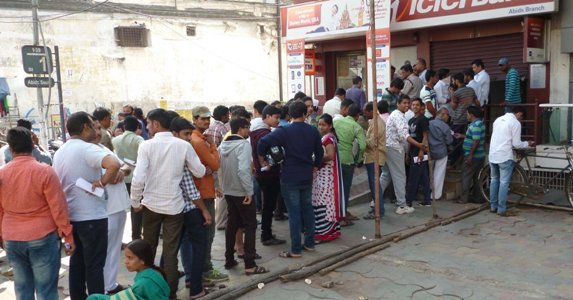Demonetization of Rs. 500 and Rs. 1000 currency notes

P M Narendra Modi’s decision to demonetize Rs. 500 and Rs. 1000 currency notes is undoubtedly for the larger good of the country, which is expected to free the country of black money, terrorism etc. Gems and jewellery industry praised the decision. But as per various reports coming from across the country are indicating toward how jewellery industr y has been used as a vehicle to convert unaccounted money into gold. Isn’t this decision giving rise to gold again becoming route for unethical practices? A report by Kavita Parab.
The day 8th November 2016 will certainly be remembered for PM Narendra Modi’s decision to demonetize Rs. 500 and Rs. 1000 currency notes, one of the few steps taken to free India of black money, terrorism etc. Even the Supreme Court of India praised the decision. “The objective behind demonetisation is to force those who have hoards of black money to deposit it in banks. The objective is laudable because black money is used to fund terrorism of various forms to weaken economy,” a bench of Chief Justice T S Thakur and D Y Chandrachud said on 15th November 2016.
The Euphoria that died down soon
There was certain euphoria immediately after the announcement as the people with unaccounted sums of money rushed to the jewellers to buy gold. Even jewellers taking full advantage of the situation allegedly sold gold for increased rates of between Rs. 40,000 to Rs. 50,000-Rs. 60,000. Some of them have even reportedly used back dated entries to show the sale of gold. Though there have been no exact data released so far, but certainly gold worth crores of rupees was sold in few hours as across Delhi, Mumbai, UP and Uttarakhand, the jewellers were reportedly doing their business until midnight.
Gold prices soared by more than 5 per cent on 8th November 2016 during European hours. While, in local markets, the price of 10 gm of gold rose from Rs. 30,000 to Rs. 34,000 on same night and has since risen up to Rs. 50,000 in certain areas of the country. The jewellery industry is happy with this additional buying and termed it as post-diwali bonus. However, some of them were even scared and stopped doing business as people coming to them with banned currency notes was already dead cash for them. While some continued accepting old cash and sold gold for at Rs. 55,000 in cash at a premium of 71.9 per cent without PAN details.
However, the excitement and happiness came to an end soon as the Income Tax (I-T) department on 10th November conducted surveys on jewellers and suspected hawala operators across Mumbai, Delhi and parts of Punjab. These were conducted by taxmen in several parts of Delhi, mainly Karol Bagh, Dariba Kalan, Chandni Chowk, Zaveri Bazar in Mumbai, Ludhiana, Chandigarh and Jalandhar. The department was reportedly acting on the information that they had received.

Problem seems to be unending for jewellery business
The year 2016 has not been great news for the jewellery industry in the country. The industry has witnessed quite a few strong upheavals during this year so far. The industry has been reeling under pressures of surge in gold prices, sinking sales, GST, aftermath of 42-day strike, PAN card norms. It seems there is no end to their troubles. The decision of currency ban has been the last blow to the industry. After a slump in the business for almost a year, Diwali and Dhanteras brought in cheer for the jewellery industry, which was hopeful of doing good business during the upcoming bridal season. But to their dismay, PM Modi’s surprise decision only added to their existing woes.
After the initial euphoria was over, on 10th November 2016, Zaveri Bazaar in Mumbai was shut for business. “Since Friday (11th November), there has been zero business and I don’t expect the business to improve any further till March 2017. During Diwali, we did good business. After a year of lull business, we saw some green shoots in Diwali but the currency ban has been a huge blow to our business,” said a wholesaler from Zaveri Bazaar on condition of anonymity. The government has also asked for CCTV footages and sales details from 8th November till date.
The decision has also hit hard the small time jewellers who having sitting without business. Hardik Kapoor, Founder of Jewelsify.com said “It is a bold step which will be positive for the economy in the long run .Although it could have been implemented in a manner where small traders and Indian SME’ face less problem as already SME’s face many problems. Initially, it will cause inconvenience for small traders and businessmen in the country,
where the reach of the modern banking system is still limited.”
The jewellery business is undoubtedly badly hurt. Even those who have not been into any unethical practices spoke about how during the time of bridal season, they have been sitting idle without business as customers are cash-strapped and jewellery would be last thing on their mind in such situation.

A leading jewellery designer and manufacturer on condition of anonymity said “My business is badly affected. My brand is known for its unique designs, which has been due to my babus/ karigars who have been working for years with me. Now for the next six months, there will not be any work. My karigars, who are mainly from Kolkata, may return to homeland in search of other work. In case, when the market improves, I may not have the same karigars. This way, my brand is finished, thanks to the PM’s decision. Though my brand has never indulged in wrong practices, we have to suffer.”
Is gold the new currency?
If reports are to be believed, hoarders are using gold as the safe haven to convert their unaccounted cash into white money. The decision led to mad rush at the jewellers’ shop. It led to dramatic rise in gold prices upto Rs. 60,000 for 10 grams on Wednesday (9th November) while market price on the day was Rs. 32,192 for 10 grams (24 carats).
Thought there is a limit up to one can buy gold in cash. In some parts of the country, gold was sold without the mandatory PAN card details or sometimes even with backdated entries. To curb unethical practices the government has made PAN card compulsory for gold purchase over Rs. 2 lakh.
India is the world’s largest gold consumer and imports a sizeable chunk of its total annual consumption of around 900-1,000 tonnes.
The Aftermath
Starting from now, the next six months are going to be the toughest phase for the Indian jewellery industry. Since last one year or more than that, gradually Indian buyers have been moving toward need-based buying. From being all year selling to seasonal selling, the transition has not only been tough but has also caused losses to the industry.
Still, some of the industry leaders feel that gold will again be looked at as safe investment haven. Supporting the PM’s decision, one of the suburban based jeweller, on condition of anonymity said “This is a period of transition. The process will take 3 to 4 months to get back to normal. But I am hopeful of gold becoming safest investment option for the people in the coming future.”
However, there is a possibility that the gold may again become the safest option to park black money. Whether the government is able to put a noose around this or people find newer ways to evade taxes and hoard black money, only time will tell.
Be the first to comment